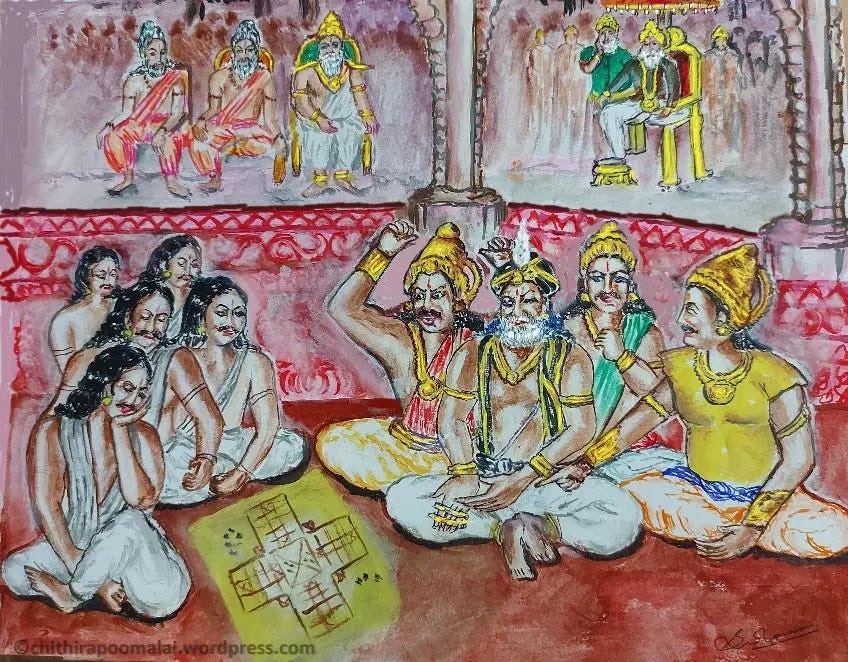The Mahabharata, one of the greatest epics in Indian literature, is filled with complex characters, moral dilemmas, and timeless lessons. One of the most pivotal moments in this epic, which ultimately led to the great war of Kurukshetra, is the infamous game of dice. A game that was meant to be an innocent pastime quickly escalated into a battle that would change the course of history. But what drove the players of this game—greed, ego, or both?
Setting the Stage: A Kingdom Divided
The stage for the game of dice is set long before the game itself takes place. The Kauravas, the sons of King Dhritarashtra, and the Pandavas, the sons of King Pandu, have always been rivals. While both families were born into royalty, it was the Kauravas who held the throne, which always created tension between the two factions. Despite their shared bloodlines, jealousy, and resentment simmered beneath the surface.
The Kauravas, led by Duryodhana, were envious of the Pandavas’ virtues, bravery, and honor, while the Pandavas, led by Yudhishthira, were noble, just, and respected. This deep-seated animosity reached a boiling point when Duryodhana, unable to bear the Pandavas' growing popularity, sought a way to assert his dominance.
The Invitation: A Trap Set
Duryodhana’s opportunity came when he invited Yudhishthira, the eldest of the Pandavas, to a game of dice in the court of Hastinapura. On the surface, the game seemed harmless, but it was designed as a trap. Duryodhana, with the help of his uncle Shakuni, who was a master manipulator, aimed to exploit Yudhishthira's sense of duty and honor.
In the royal courts, gambling was a common practice. Yet, it was meant to be a contest of skill and chance, not something that would determine the fate of a kingdom. However, Duryodhana's ulterior motive was clear: he wanted to strip the Pandavas of their kingdom and power.
The Greed and Ego of Yudhishthira
Yudhishthira, bound by dharma (righteousness), felt obliged to accept the invitation, despite his doubts. He was a man of principle, and he believed that a king should always honor his word, even when it meant making sacrifices. But this sense of duty led him to play in the first place, and he was soon lured into the game, with his ego as the prime motivator.
As the game progressed, the stakes kept rising. Yudhishthira began wagering his kingdom, his wealth, and even his brothers. Each time he lost, the desire to regain what he had lost grew stronger. His pride and ego made it impossible for him to step away, and his belief that he could outplay his opponents kept him at the table. In the end, Yudhishthira’s rash decisions led him to stake everything—even himself.
The Loss: A Fall from Grace
As the game reached its conclusion, Yudhishthira was forced to bet himself. The final blow came when he lost everything, including his freedom. In a cruel turn of fate, he and his brothers were exiled to the forest for thirteen years, with the final year to be spent in disguise. The humiliation of their defeat was not only personal but public, as the Kauravas made sure to shame the Pandavas in front of everyone.
The loss of their kingdom, wealth, and dignity was a hard pill to swallow for the Pandavas, but it was not just the physical loss that mattered. It was the emotional toll, the breaking of their spirits, and the sense of betrayal that fueled the bitterness that would later lead to war.
The Role of Greed and Ego in the War
The game of dice serves as a perfect example of how greed and ego can escalate into far-reaching consequences. For Duryodhana, the desire for power and control overrode any sense of justice or morality. He manipulated the situation to humiliate his cousins and eliminate any possible threat to his rule. His greed knew no bounds, and he failed to see the long-term repercussions of his actions.
On the other hand, Yudhishthira's ego and sense of honor led him to make decisions that, in hindsight, were reckless. His unwillingness to back down from a seemingly noble cause allowed the situation to spiral out of control. Had he not placed such value on his pride and reputation, he may have avoided the tragedy that followed.
But the most tragic part of the game of dice is how it set the stage for war. What could have been a simple disagreement over land and power turned into a brutal war that would take countless lives. The battle of Kurukshetra was not just about the claim to the throne; it became a war of ideals, with each side representing different values and virtues. The Kauravas, led by Duryodhana, embodied ambition and pride, while the Pandavas, led by Yudhishthira, embodied duty, honor, and justice.
Conclusion: Lessons from the Dice Game
The game of dice in the Mahabharata is a powerful lesson on how greed and ego can lead to devastating consequences. Yudhishthira’s pride and Duryodhana’s ambition escalated a simple game into a full-scale war. It reminds us that unchecked desires and arrogance can destroy even the greatest of empires, making wisdom, humility, and self-control essential for true leadership.
For any complaints or removal requests regarding the content I've generated, please use the contact form provided at: https://www.inderneilk.com/contactus




